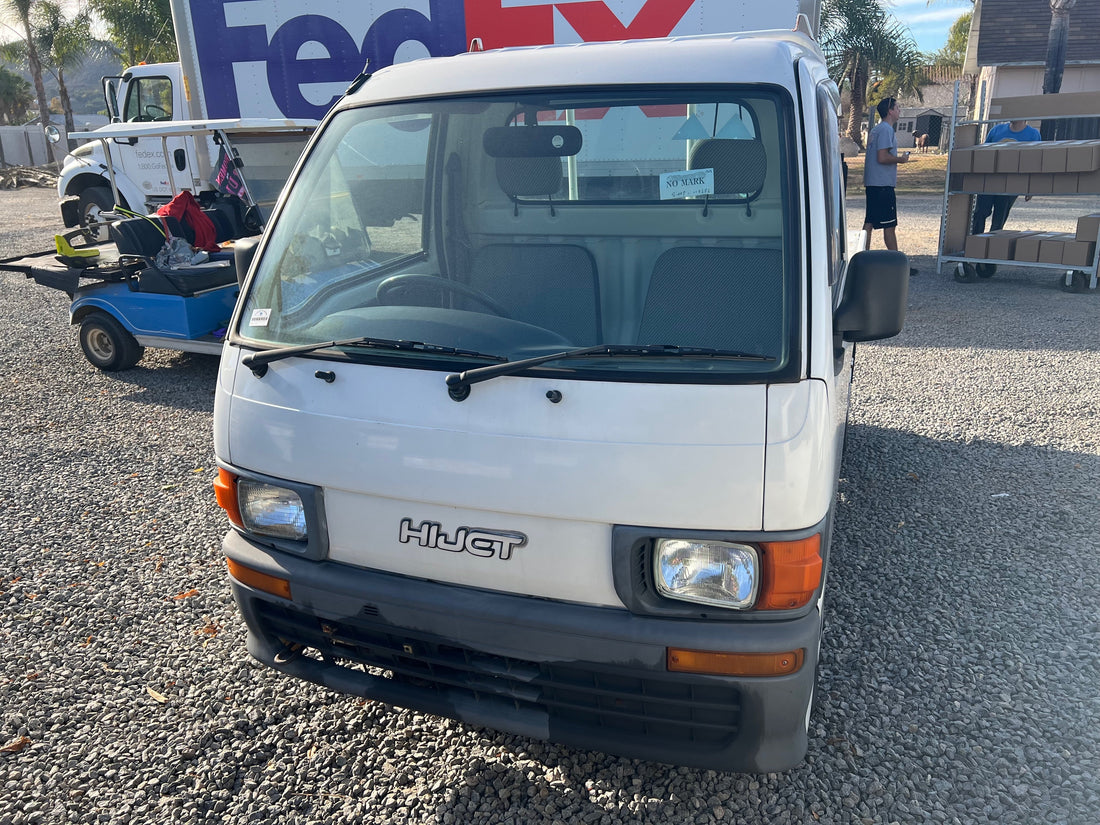
State Restrictions for Kei Trucks
The regulations governing driving kei trucks older than 25 years old on public roads can vary significantly from state to state, and even within counties, especially regarding passing emissions tests. We breakdown where these miniature trucks can roam freely and where their presence is more constrained.
New kei trucks are unfortunately not street legal at this time and can only be used on private property. Restricted states like California only allow private land use for used kei vehicles as well.
For those who just want a quick overview, here are the key takeaways
- Kei trucks that are 25 years or older qualify for federal import exemption and can be legally registered in many states.
- New Kei trucks are not street legal in the U.S. and are restricted to private property use only.
- Some states fully allow 25+ year-old Kei trucks on public roads, while others restrict them to agricultural, off-road, or special-use registration.
- A few states, like California and New York, completely prohibit Kei trucks from public roads due to emissions and safety regulations.
- Local county laws may impose additional emissions and registration restrictions, even in states that allow Kei trucks.
For those who want detailed information, let’s break it down further.
UPDATES: JULY 2025
A number of states permit 25-year-old (and older) Japanese Kei trucks to be registered and driven on public roads, often taking advantage of the federal 25-year import exemption. In these states, owners can obtain license plates and operate the mini-trucks on regular roads, though certain usage conditions or classifications usually apply:
States Allowing Broad On-Road Use
Several states allow 25+ year-old Kei trucks on most public roads much like any other vehicle, with minimal extra restrictions beyond standard registration and safety requirements.
- Indiana permits mini-trucks on public roads and highways with no special speed cap, provided the owner has a valid title and registration.
- Idaho allows Kei trucks on roads, including state transportation board roads, without explicit speed restrictions.
- Oklahoma allows Kei trucks on all public roads except interstate highways.
- Wyoming registers them as “multipurpose vehicles,” requiring them to keep to the right-hand lane when possible.
- North Carolina explicitly allows Japanese mini-trucks on roads with speed limits up to 55 mph, provided they have essential safety equipment (headlights, seatbelts, wipers, etc.).
States Imposing Speed or Road-Type Restrictions
Many states that allow Kei trucks for street use still limit them to lower-speed roadways or non-interstate travel for safety reasons.
- Florida allows Kei trucks on roads with speed limits 35 mph or below and requires county approval for registration as an off-road or recreational vehicle.
- Ohio permits mini-trucks on roads with speed limits 35 mph or less, with local jurisdictions retaining the right to impose additional restrictions.
- Tennessee allows Kei trucks on roads with posted speeds of 35 mph or lower, treating them similar to low-speed vehicles.
- New Hampshire confines Kei trucks to roads 35 mph or below and requires them to stay within a 25-mile radius of the owner’s residence or business if used commercially.
- Louisiana allows street use on roads up to 55 mph, with restrictions on interstates or controlled-access highways.
-
Texas,Reflect SB 1816—Kei trucks can now be titled, insured, and driven legally
States Requiring Special Registration Categories
Some states make Kei trucks street legal only under particular registration classes, often exempting them from stringent testing or regular use.
- Wisconsin allows Kei trucks to be registered with collector or hobbyist plates, given the vehicle’s age.
- Illinois does not broadly allow Kei trucks on roads, but some enthusiasts have successfully registered them under antique or special-use vehicle status.
- Virginia only titles/registers Kei trucks as antique or specially constructed vehicles, restricting them to hobbyist use rather than daily driving.
- Mississippi permits full on-road use of Kei trucks but requires a $100 title bond, bill of sale, and ownership application.
- Texas, as of April 2024, allows Kei trucks 25 years and older to be titled and registered like normal vehicles, provided they pass a state safety inspection.
Other states allowing limited road use include Alabama, Arizona, Kansas, Nebraska, South Carolina, South Dakota, Utah, and Washington, each with its own specific rules regarding speed limits and road types.
States with County-Level Variations
Even in states where Kei trucks are legal, county-level emissions and safety requirements may introduce additional hurdles.
- Illinois and Missouri leave the decision to allow Kei trucks up to municipalities or counties.
- Minnesota and Montana do not broadly authorize on-road mini-truck travel statewide, instead permitting local governments to regulate them.
- Kentucky restricts mini-truck operation to jurisdictions that explicitly allow them, typically for crossing state roads only.
- Utah permits Kei trucks statewide, but Salt Lake County enforces stricter emissions rules than rural counties, making registration more difficult.
- Wisconsin requires emissions waivers in certain counties for Kei trucks built between 1996–1998, whereas trucks older than 1995 are exempt.
States Where Kei Trucks Face Restrictions or Are Banned
Some states heavily restrict or outright prohibit the use of Kei trucks on public roads due to safety concerns, emissions requirements, or failure to meet Federal Motor Vehicle Safety Standards (FMVSS).
- Georgia explicitly bans Kei trucks from registration and is actively revoking previously issued titles.
- New York and New Jersey follow federal guidelines strictly, preventing registration unless the owner somehow brings the truck into FMVSS and EPA compliance (an almost impossible task).
- Pennsylvania stopped issuing regular registrations for Kei trucks in 2021, restricting them to off-road, farm, or antique vehicle status only.
- Rhode Island began revoking existing registrations in 2021 and has prohibited new registrations.
- California does not allow Kei trucks on highways or roads above 55 mph and enforces strict emissions requirements that effectively bar them from legal registration.
- Maryland, Connecticut, New Mexico, Iowa, Nevada, Oregon, Vermont have either no legal framework for Kei truck registration or have outright banned them.
- West Virginia allows only farm use within 20 miles of the farm, with no general public road use.
- Hawaii does not permit Kei trucks on public roads, treating them as unregulated off-road vehicles.
Recent or Pending Legislative Changes
Several states have recently reversed bans or are considering changes to their Kei truck laws.
- Massachusetts initially banned Kei trucks in mid-2024 but reversed the decision, fully legalizing 25+ year-old Kei vehicles for road use.
- Texas officially changed its stance in April 2024, now allowing Kei trucks to be registered like normal vehicles.
- Maine attempted to pass a bill in 2023 to legalize limited on-road use, but it failed in committee.
- Rhode Island has proposed a law to formalize its ban, preventing any future Kei truck registrations while revoking existing ones.
- Georgia is facing a legal challenge over its ban, with some counties considering ordinances to allow Kei trucks locally despite the state policy.
- Michigan, Colorado, and Washington have seen growing interest in re-legalizing Kei trucks, with potential bills expected in the coming years.
Navigating the legality of Kei trucks in the United States involves understanding a patchwork of state and local regulations. While states like Idaho, Montana, and Oregon have embraced these compact vehicles, permitting their use on public roads with certain conditions, others like California, New York, and Massachusetts impose stringent restrictions due to safety and emissions concerns. Additionally, some states like Utah and Missouri exhibit county-level variations, where regulations may differ significantly from one region to another.
Understanding these regulations is crucial for current and prospective Kei truck owners. By thoroughly researching state and local laws and ensuring compliance with all necessary requirements, enthusiasts can enjoy the benefits of these versatile vehicles. As the popularity of Kei trucks continues to grow, staying informed about the evolving legal landscape will be key to maximizing their utility and enjoyment on U.S. roads.
